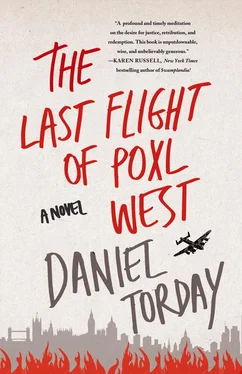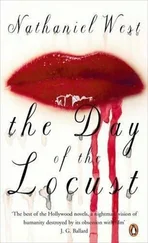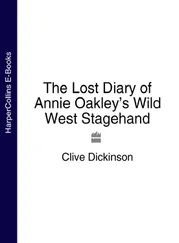“When the dentist noticed my swollen belly, he erupted at first, thinking I was claiming it was his, that I wanted money from him. Strange as it might sound, when he came to understand that the baby wasn’t his and that was not what I was asking, he calmed. And at that same time, a preternatural peace seemed to come over Frau Braun.
“I have learned from my work how to read people. I saw something in Frau Braun’s face — something I’d come there looking for. So I stopped pleading. I made my proposal overtly.” And so I came to understand that this was what had taken her back to the Brauns that night. There was some safety in her knowing her baby would have a comfortable home with them, and that she could go to see her if she wished.
She stopped talking and looked at me.
“So, you see,” she said. “Heidi Braun, the Braun’s little girl — she’s mine.”
And with her story complete, Françoise said she was tired. There was nothing more to say. It occurred to me, among other things, that Françoise was a good bit older than I’d assumed her to be. But surely I wouldn’t remark on such a fact — now, or ever. We crawled off to her bed and went to sleep.
7.
Inside my door one afternoon weeks later I found a travel-worn envelope. My father’s rendering of my address there on Scheepstimmermanslaan was barely legible. The first part was dated August 8. It had long been delayed in its arrival.
“Dear Leopold,” the letter began.
Thank you for your letter no matter how brief or belated. Your mother is fine and I am fine and little Pitzky the dog is fine. We have all been wondering about you. We are each fine. In spring Hitler slept the night in Hradcany to spit in our faces. The German soldiers took over Prague with tanks and guns, but not Leitmeritz. I have written the national bank in Prague and I have heard nothing back but we can no longer maintain our funds and we can no longer make purchases and we can no longer liquidate our assets.
I have not heard from Johann Schmidt and I learned only the other day he has left for New York and could not have provided you with leather work so you cannot have work from him. What are you doing to keep aloft, my son? Please write to tell us. It pains me that we did not say good-bye to each other before your departure, but your mother explained you’d had a fight over money and so you left. I’m sorry that I was not there to see you off and know that I worry about you. Please understand I will do for you what I can from afar. And that I already have. Poxl you should go to the Leathersellers College in London. It will be possible for you to obtain a student visa to attend the school there. Johana and Niny can provide you a place to live and an introduction to the city. I have made arrangements with an associate in the consulate for you to have an exit visa from the Netherlands and a visa into England. You should leave immediately.
You ask after our lives here — the Bauers’ sugar factory outside of Prague has been taken. I have gone to the Central Jewish Office and registered. I have papers and no one else has the expertise to run Brüder Weisberg. At the office in Prague they say they will send up a Devisenschutz Sönderkommando to look over our records. A troop of German soldiers has come through our neighborhoods in Leitmeritz, asking, and we are sure to see them again. One came up the Muehlengasse a few weeks ago and asked after our business and I asked was he the Devisenschutz Sönderkommando and he asked after my papers, but I told him I didn’t have them and he said he would be back. He was the man who came through to find out. I would see others soon enough, he said.
Here there was a break in my father’s letter. After the caesura my father had written the new date, September 22, in a hand substantially less neat than the one that proceeded it.
I write again without amendment or revision. The devisenschutzsönder-kommando has come to the house. We will not control Brüder Weisberg and I would not tell you Leo that I put up a fight. But what could I do? There was nothing to do. What will become of it anyway? No one could tell you not, least of all me.
Leo I am looking to London, from where we might be able to reach Palestine now and you must do the same and come from Holland this minute if you have not already. You must go to the British consulate in Rotterdam where I have arranged for a visa in London.
Your father
I did not note at the time the absence of any mention of my mother at all in the second part of my father’s letter: the cease of majesty dies not alone, but like a gulf doth draw what’s near to it. Wise as my father’s advice might have sounded, and wise as it clearly was in retrospect, leaving Rotterdam meant leaving Françoise.
I reread the letter.
I thought of Heidi, and it made me think of Françoise with the Brauns, but that was not enough to rend me from her. I sat down at my desk and wrote a long reply. I told my father I wished him and my mother well in their travels to London and hoped they would arrive safely. He should write me at the address I gave to tell me he’d arrived. I’d met a woman now, and while I didn’t tell him it was love that was keeping me — who can say in the moment what makes him do anything? — I told them that I was happy to be there with her. My home now was in Holland, with Françoise.
8.
War broke out across Europe. My father did not write again. The Tennessee Sisters played their gigs at the Café le Monde. Greta sang a high close harmony a third above Françoise’s leads as they sang “What Would You Give in Exchange for Your Soul?” Their English was still a little rough, a little full of umlauts I now understand one does not generally find in a bluegrass song. Their clients had provided them with rawhide boots embroidered with colored leather, and shirts with studs and peaked shoulders. They looked the part. If he wears the uniform long enough, even the most peaceable man may grow to be a soldier.
I tried not to think about where Françoise had gotten those clothes each time I saw her play, but on the Saturday-night gig after my father’s letter, for the first time it began to eat at me. My father’s letter had begun to place some new thought in my mind: I imagined him at work the day I found my mother with her painter, going about his business while my mother went about hers. Was I so different now here in Rotterdam? Well, I knew about Françoise’s profession in a way my father didn’t know of my mother’s surreptitious actions. But was that only rationalization? There was a visa to London. I was staying here with a woman who received all these things in exchange for — what?
Françoise’s and Greta’s voices blended beautifully. There was something to the act of harmonizing itself that smacked of precision: two voices doing two different things, diverging so they might come together as one, greater than either alone.
Françoise looked as happy as she ever had that night. Fifty Dutchmen were in the crowd. Who had come to listen, to see them, knowing them in the many ways a man can know a woman? Who’d simply stopped on the street upon hearing two Dutchwomen singing American gospel songs? I will never know. Françoise’s fingers traveled deftly up her instrument, pulling out double stops and picking loose melodies over Greta’s guitar playing. When they finished, Françoise showed me her mandolin case, which was piled full with guilders she’d received as tips, and she was too happy then for me even to think of starting a serious conversation about the future.
I suppose there are men who when they are in love know to call it love, who know its shape, its demands. Who are able to tell when its wings have begun to rust. You will not find my name anywhere on that manifest. My understanding of my concerns was somehow more immediate in those days. Since the afternoon I’d fled my mother’s house I had only one direction and that direction was forward. To stop and survey, to stop and understand how I was feeling, would have been fatal. Perhaps it was this myopia that caused the most catastrophic decisions during that period of my life. Perhaps that’s too easy.
Читать дальше












